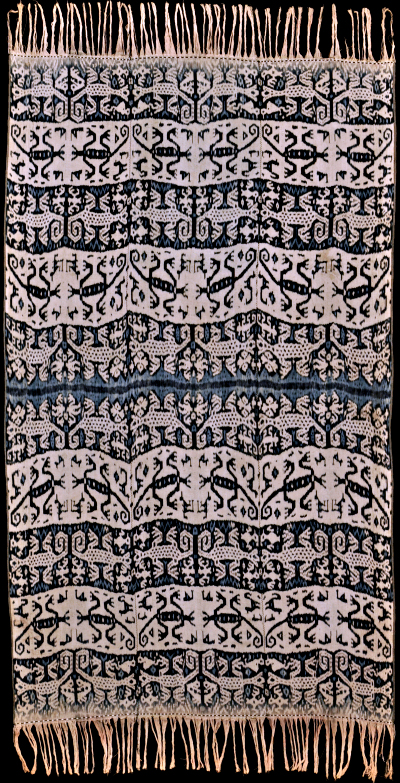| |
 
 | | | |
005 Timor, West Timor
Mau naek (men's wrap)  
| | Locale: | Pusu or Lekat, Amanuban. | | Period: | 1950-1960 | | Yarn: | Cotton, commercial, fine, quad-ply | | Technique: | Warp ikat | | Panels: | 3 | | Size: | 122 x 206 cm (4' 0" x 6' 9") LW: 1.69 | | Weight: | 750 g (26.5 oz), 298 g/m2 (0.98 oz/ft2) | | Design: | Intricate design with scorpions, crocodiles (buaya, symbols of ancestors), birds (kolo, a kind of Timorese garuda), chicken (manu, symbol of male prowess) and other animals in white and indigo covering the entire cloth. | | Comment: | Tightly ikated example of a style typical that is typical for Niki-Niki: all indigo on white, no border stripes, entire cloth covered in animal figures. Commercial cotton, very fine, used quadruple ply to give the cloth a substantial feel. A few very light smudges, otherwise in immaculate condition. The alternation of drawing in indigo on white and white on indigo is typical for the desa of Pusa and Lekat in Amanuban. | | Background: | Chapters on Timor and West Timor. | | Exhibited: | Timor: Totems and Tokens, Museu do Oriente, Lisbon, 2019/20. | | Published: | Woven Languages, 2014.
Ikat Textiles of the Indonesian Archipelago, 2018.
| | Compare: | 181 | | Sources: | Cf. Amanuban cloth in Yeager and Jacobson, Textiles of Western Timor, Fig. 95. In this piece, too, the entire field is covered in zoomorphic imagery in white and indigo, though without the foreground-background reversal per band that makes this cloth so striking. See also same work Fig. 101c, showing detail of western Amanuban cloth marked by alternating bands with light and dark backgrounds. Ascription of optical reversal to Pusu and Lekat, p. 133. | | |

©Peter ten Hoopen, 2025
All rights reserved.
|
|


